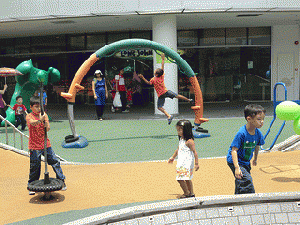| Back OpEd News | |||||||
|
Original Content at https://www.opednews.com/articles/A-Playground-View-Of-the-M-by-Mariano-Carrera-Arab_Attitudes_Easter-Bunny_PERSPECTIVE-131228-645.html (Note: You can view every article as one long page if you sign up as an Advocate Member, or higher). |
|||||||
December 28, 2013
A Playground View Of the Middle East
By Mariano Carrera
Going to playgrounds and parks has been a very useful tool in understanding the Arab society. From a father's perspective the Middle East problems requires attention to building a civil society. Positive changes ould only occur then becuase kids are not being aware of what is required to build a progressive society.
::::::::
Forget the Arab Spring, based on what I have seen in playgrounds in Oman, UAE, and Kuwait, a few generations are required for any positive social change to occur.
The fundamentals of civil society are not generally taught nor is the full traditional picture told. Going to playgrounds and parks has been a very useful tool in understanding the Arab society. The dual nature of the society and its contradictions are not seen as such but rather the way things are done. Family, manners, respect, care, and other elements are applied in select cases and not evenly.
Parental involvement with kids are limited. Despite concerns raised by regional politicians, maids dominate the playgrounds. If seen, that rare species, the father is normally an expatriate and mainly western. For a healthy society the parents must be involved in the child's holistic development. Playground activities included. Speaking with maids, there in not much difference at home.
Manners is also lacking. Please, thank-you, excuse me, and other phrases are another rarity at the playgrounds. The occasional polite phrase in Bahasa, Hindi, Urdu, Spanish and ever present English is heard. However in Arabic there is a silence. Kids brushing aside others, and going about their perceived rightful way are the norm. Simple manners are not known. The look on kids' faces when reprimanded tells a tale.
Respect for elders and others again limited. I had the horror to hear a boy, around 8 years old, tell another, "No need to listen to her, she's just the maid." This form of disrespect is extended to wider society, the cleaner, driver, service worker, and anyone deemed below one's standing. The saying, you can know the quality of a society by the way it treats the weakest, points out the poor quality of the Arabian society despite its outward appearance. That inner love, care, and concern for others is again selective.
Holistically educating the young is not a concern. Books and educational materials for kids are limited and even then, there few to help the children get the most out of the educational toys. The maids in the playground eventually open up to the novelty of a male parent walking and playing with his baby son.
When I read about traditional Arab society and even the modern founders, Sultan Qaboos of Oman, Sheik Zayed of the UAE, and others, the Middle East was attractive. Living in the region for 10 years has been a shocking social disappointment with glimpses of hope. Family is talk about as an obligation rather than a joy. Thus despite regular family occasions there is sense of gloom. Despite the long greeting rituals among peers, the attitudes to maids, drivers, and service person is of scant to non-acknowledgment. Locals do not think of the payment and work conditions of their maids yet complain of the hours at the office, especially in the private sector. Many young adults were not taught local history in school. A collective brainwash to form a new society is needed. Reading is not encouraged, despite the Arab World's glorious past in learning and thinking. Questioning is actively discouraged which is probably not what Al Farabi, Al Ghazali, (early Arab and Islamic philosophers) and others would have imagined.
Raising questions on these dualities can result in a polite distancing. "We do not talk about that," is the quick refrain. An Indonesian friend of mine said, "closer to Mecca, further from Allah," when looking at the society. The virtues of a civil society, even, as described in Islam, are not fully followed. Despite the beautiful teachings and history of the Arab world, the playgrounds tell me, the story needs to be told of what a civil society is and what existed years ago.
Authors Bio:
Mariano has lived in Oman, UAE and Kuwait since 2003 working as a senior technical professional. Mariano’s son was born in June 2012 in the UAE and the family now lives in Kuwait. Mariano have also lived in Trinidad and Tobago, Jamaica and Thailand when not travelling (42+ countries).
